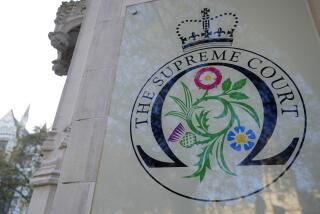Enemies Negotiate U.N. Control of Rwanda Airport
- Share via
NAIROBI, Kenya — Rwanda’s warring sides met in delicate negotiations Wednesday to give U.N. troops full control of the capital’s airport, the lifeline for the embattled city and the staging point for 5,500 new peacekeepers.
U.N. officials want rebel and government troops to withdraw all weapons at least 1 1/4 miles from Kigali airport. That would force the army to abandon its heavily defended Kanombe camp, which rebels have been attacking, and force the rebels to give up strategic positions.
A lull in fighting around the capital recently allowed aid workers to rush relief supplies to about 15,000 people living under U.N. protection in the capital.
But U.N. spokesman Abdul Kabia in Kigali said the situation is growing steadily worse in areas where refugees have sought protection.
He said many are sick with malaria and dysentery, and the United Nations and relief groups cannot provide adequate care.
Kabia said both sides have agreed to give the United Nations full control of the airport. Cooperation from both sides is a key element in U.N. plans to reinforce its peacekeeping force with 5,500 new troops and to set up safe areas for civilians in the city and countryside.
The U.N. Security Council authorized the new, all-African force for Rwanda on Tuesday, but Kabia said it was not known when the first troops will arrive.
In Paris on Wednesday, Bernard Kouchner, former French humanitarian action minister, described the horror of beheaded children in Kigali and urged the United Nations to set up a rapid action force.
“You walk all over children’s bodies. You find in the grass heads of children aged 6, 8, 2, beheaded with machetes,” Kouchner told French television after returning from Rwanda. “What we want is a United Nations rapid action force in order to prevent massacres from occurring rather than go in later and deplore them--firemen prior to the blaze.”
Kouchner said the massacres were not ethnic fighting but a genocide carried out by the majority Hutu government against the Tutsi minority and its Hutu allies.
The killings began April 6, after the presidents of Rwanda and Burundi, both Hutus, were killed in a mysterious plane crash.
All the figures about Rwandan dead are estimates. Nobody has tried to count the dead piled up on city streets, hidden in the countryside, buried in mass graves or dumped by the tens of thousands into rivers.
German Foreign Minister Klaus Kinkel told reporters Wednesday in Bonn that information gathered by Europeans indicated that about 500,000 people have been killed, a figure cited by some aid workers.
Until recently, the United Nations had estimated the toll at 200,000.
More to Read
Sign up for Essential California
The most important California stories and recommendations in your inbox every morning.
You may occasionally receive promotional content from the Los Angeles Times.













